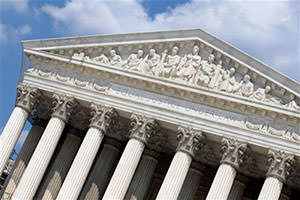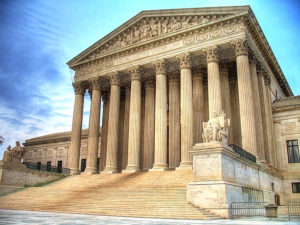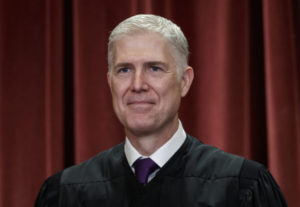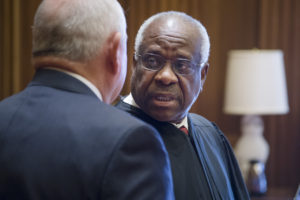This Far-Right Supreme Court Is Reason Enough to Vote Obama
Four of the sitting justices are 74 or older. Each can be expected to step down over the next four to eight years.
We can take away two lessons from the first high-profile oral argument of the Supreme Court’s new term, which began Monday. Lesson No. 1 is that the court is already a hard-right institution. Lesson No. 2 is that the re-election of President Barack Obama is more crucial than ever if the court’s movement to the right is to be slowed or possibly reversed.
The argument — in the case of Kiobel v. Royal Dutch Shell Petroleum — involves an international human rights complaint brought under the Alien Tort Statute (ATS) of 1789 against the giant oil conglomerate by 12 Nigerian nationals, all of whom have received political asylum in the United States and at least one of whom is now a U.S. citizen. The plaintiffs contend that Shell assisted and was complicit in the torture and killing of members of the Ogoni tribe in the Niger Delta carried out by the military dictatorship of Gen. Sani Abacha in the early to mid-1990s.
By its terms, the ATS authorizes federal courts to hear civil actions by aliens for torts “committed in violation of the law of nations or a treaty of the United States.” Although the statute was largely dormant for 200 years, a string of lower-court precedents issued since the 1980s breathed new life into it, sparking a small but important wave of human rights litigation targeting abuses stretching from Paraguay to New Guinea, from Liberia to Mexico. It made sense, therefore, that when the Kiobel plaintiffs were unable to find any semblance of justice in Nigerian courts, they joined the trend, filing suit in 2002 in New York.
Eventually, Kiobel made its way to the Supreme Court for oral argument in February to test the narrow question of whether the ATS could be applied to corporations. But as happened in the infamous Citizens United case — which commenced with a narrow focus before expanding exponentially to rewrite the law of campaign finance — the justices ordered Kiobel to be re-argued Oct. 1 to address the larger issue of whether the ATS can ever apply to acts committed on foreign soil, especially those involving foreign corporations and foreign sovereigns.
If the tenor of the oral argument holds, the court’s five Republican appointees appear poised not only to dismiss the Kiobel complaint but to rule broadly that the jurisdiction of American courts does not extend beyond U.S. territory absent an explicit grant of congressional authority. As the plaintiffs’ lead attorney Paul Hoffman, a former legal director with the ACLU Foundation of Southern California, told the justices, such a ruling would mark the end of a movement in favor of “universal justice” and allow torture and atrocities around the globe to go unpunished. In short, from a human rights perspective, such a ruling would be a game-changing outrage.
Each of the court’s Democratic appointees expressed dissenting views during the Kiobel argument, with 79-year-old Ruth Bader Ginsburg the most vociferous — a fact that underscores not only how far the court’s majority has moved to the right but also how directly the court’s future is riding on the outcome of the presidential election.
To be sure, Obama has disappointed many progressives, especially in the areas of national security and military engagements around the world. And in the Kiobel case itself, appearing as a nonparty “amicus” (friend of the court), the administration urged a tepid and ultimately unsatisfying middle ground that would permit some ATS lawsuits to proceed against U.S. corporations for acts committed abroad while prohibiting such lawsuits against foreign nations and companies.
Still, despite the disappointments with Obama, only a political purist holding out for perfection could fail to see the difference, going forward, between a court dominated by Mitt Romney appointees and one shaped by Obama, or after a second term, his Democratic successor. In addition to Ginsburg, three of today’s sitting Supreme Court justices — Antonin Scalia, Anthony Kennedy and Stephen Breyer — are 74 or older. Each can be expected to step down over the next four to eight years.
For the remainder of the court’s present term, as the high tribunal takes on challenges to affirmative action, voting rights and same-sex marriage, the best progressives can hope for may well be the kind of damage control afforded by narrowly crafted 5-4 decisions in which Justice Kennedy or Chief Justice John Roberts sides with the liberals. But looking ahead — as progressives must — the court is certain to revisit a host of issues central to the lives of all Americans, including campaign finance, civil rights and abortion.
The concrete question facing us is whether when the court tackles those momentous issues, we want the nation’s highest judicial powers wielded by another Samuel Alito or Clarence Thomas or another Sonia Sotomayor or Elena Kagan. The answer, starting with the re-election of the president, should be a no-brainer.
Your support matters…Independent journalism is under threat and overshadowed by heavily funded mainstream media.
You can help level the playing field. Become a member.
Your tax-deductible contribution keeps us digging beneath the headlines to give you thought-provoking, investigative reporting and analysis that unearths what's really happening- without compromise.
Give today to support our courageous, independent journalists.





You need to be a supporter to comment.
There are currently no responses to this article.
Be the first to respond.